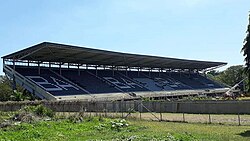 Govind Park during its revamp in 2023. | |
 Interactive map of Govind Park 4R Electrical Govind Park | |
| Location | Ba, Ba Province, Fiji |
|---|---|
| Coordinates | 17°32′17″S177°41′28″E / 17.53806°S 177.69111°E |
| Owner | Ba Town Council [1] |
| Operator | Ba Town Council [1] |
| Type | Multi-purpose stadium |
| Capacity | 13,500 |
| Field shape | Rectangular |
| Surface | Grass |
| Construction | |
| Opened | 17 July 1976 |
| Renovated | 2016–2024 |
| Years active | 1976–2016; 2025–present [1] |
| Construction cost | FJ$13 million (redevelopment) [1] |
| Tenants | |
Fijian Drua (2026–present) Ba | |
| Website | |
| batowncouncil.com.fj | |
Govind Park, known as the 4R Electrical Govind Park for sponsorship reasons, [2] is a multi-use rectangular stadium in Ba, Fiji. [3] [4]